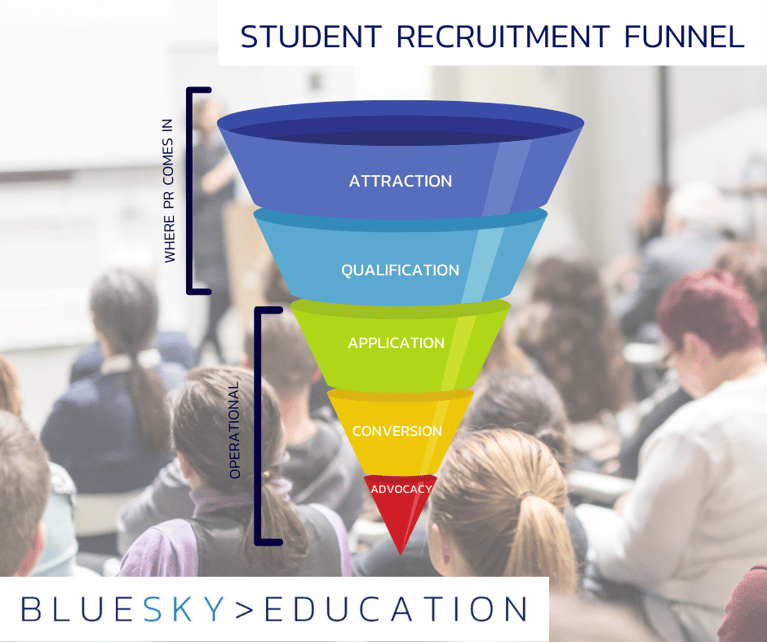
Is Creative AI Becoming A Problem?
“You know what the biggest problem with pushing all-things-AI is? Wrong direction.

How you can make the most of rankings using PR?
It’s often the same story every year. Business school rankings are released by notable, influential media platforms and organisations all around the world.

How business schools can attract international students
Regardless of ranking, prestige or the specialisms a business school might offer, there is little doubt that part of what makes a programme uniquely valuable is the cohort.

Lessons from two of the best (and one of the worst) PR campaigns of 2023
It’s typical to make some form of resolution at the start of a new year – a commitment to ourselves to do better, be better than we were during the year before. Personal pursuits might include aiming to eat better, exercise more or simply to make more plans with family and friends.

The journalist said yes... now what?
If you’ve read our previous blogs on how to craft a compelling pitch or construct a powerful press release and have taken our advice to heart you’ll, hopefully, by now have been on the receiving end of some positive responses from journalists at your target publications.

Why international PR is so different to domestic PR
When was the last time you sent out an email inviting a journalist to attend an on-campus event, and received a positive response? Or sent out a release under embargo, only to receive silence in response?

“They didn't quote what I said! Why should I bother?”
5 reasons why you didn’t get quoted… The bread and butter of any public relations strategy is media engagement – securing opportunities to speak directly with journalists from a wide range of outlets, across your target audiences and geographies. Sharing your voice, your institution’s values, your expertise and successes with credible media gives you a greater platform to be seen and heard, as well as actively demonstrate your worth.

3 ways it pays to keep your competitors close
Higher education institutions often strive to set themselves apart from the crowd. For their programmes to be viewed differently – more innovative, more industry-focused, more competitive, better respected – from similar market offerings. The ideal of being “unique” is highly sought.

6 steps for developing a PR strategy for rankings
If you’re working in business school or university communications you’d be forgiven for sighing when you see that this blog post is dedicated to the topic of rankings.

7 tips to help get your faculty noticed by the media
The role of the media relations team within business and higher education institutions is not an easy one. Straddling the worlds of fast-paced news and considered academic exploration it can be tricky to match your institution’s expertise to a journalist’s needs at the right place and time.

Gender equality in higher education
My colleague Stephanie Mullins and I recently gave a webinar on how to why we must highlight the successes of women in higher education through the media - and how to do it (for those of you who missed it and would be keen to take a look – its available for free on-demand on our website!)

5 Things about writing compelling content you'll kick yourself for not knowing
When it comes to writing online content we know we face stiff competition.

10 reasons NOT to invest in media relations
It may be counterintuitive, since we are a media relations company, to write a blog telling our audience why they simply shouldn’t bother engaging with the media – or employing an agency to do it for them. Sounds a bit like we’re shooting ourselves in the foot, doesn’t it?

How to create content people actually search for
One of the first things you’re told when trying to create an online presence – whether for an institution, for a programme or for an individual, is that, to create an impact, you need content.

How higher and business education PR has evolved
It’s natural to expect that, over the course of time, the ways in which a university or business school operates will change. The past five years alone have been testament to just how much the world of education has evolved; the advancements in and preferences for online education over classroom-based learning for example, or the shift in curriculum focus to highlight increasingly important topics such as ethics and sustainability, all in the pursuit of providing a better, more valuable experience for students.

Should PR feature in your student recruitment funnel?
(Here’s a hint: the answer is YES!) When choosing where to study my own degree I didn’t just stick to reading university prospectuses and the rankings, I also took the time to look at what other people were saying about the institution and its programmes outside of what the universities chose to share. I read the stories of alumni and I took note of students who’d shared their experiences in newspapers, magazines and blogs.

How to initiate partnerships with other universities & business schools
As Valentine’s Day wraps up, and love is in the air, it seems everyone is thinking about partnering up…

What does it take to build an effective PR strategy?
“Let’s do some PR for this”… A member of your faculty is hosting an event, or has published a book perhaps, or a new programme has been launched by your institution, and the request comes in… “Let’s do some PR on this.”

How to optimise your web content
There’s no doubt that the role of a PR and communications expert within a higher education institution is a demanding one. Having to keep one foot firmly entrenched within all the comings and goings of their institution and the other foot in the wider world outside, and trying to marry the two. With multiple stakeholders to keep satisfied; students, applicants, faculty, Deans, corporate partners and alumni. It’s an exhaustive list.

Why PR isn’t a luxury – it’s a necessity
Are you wondering whether to engage in PR? Or, perhaps you’re considering reducing, or removing PR services from your institution altogether. If either of the above are true – particularly the latter – please do read on…

How to work effectively with media in China
China is home to an estimated 1.3 Billion people, is the world’s second largest economy and has one of the one of the largest media markets in the world. Unsurprisingly, being able to tap into it is a highly appealing prospect for any higher education institution.

7 steps to securing meetings for your faculty abroad
Whether accompanying MBA students on international study trips, attending overseas recruitment fairs or speaking at industry events, such excursions provide the ideal opportunity to raise the profile of their school on a wider scale by engaging with local media.

Who are you pitching to?
When sending a pitch to a journalist, what’s the first thing you need to check before hitting send? Checking your information is accurate perhaps? Making sure it’s short, swift and to the point? Making sure you’ve spelled their name correctly?

5 Ingredients for a successful story
Not all news is news. And any PR professional doing their job properly knows that securing quality media coverage isn’t just about flinging every bit of information a client shares with them out into the world and hoping some of it gets noticed. We spend a great deal of time sifting through the information our clients share with us to find the stories that will make the best impact with their target audiences. But sometimes those stories that can be media gold aren’t always the easiest to spot, or even the easiest to communicate clearly and convincingly to your press contacts. To stand the best chance of success, there are five ingredients that need to be included in your pitches... 1. A clear focus What are you trying to communicate? Consider the information you are sharing and keep the message as clear, and simplistic as possible. Your pitch cannot be too lengthy or have too many tangents. A time-pressed journalist needs to be able to scan your pitch and immediately identify what you/your client is offering, and what their angle on that topic is. 2. Relevance It might sound obvious, but you’ve got to know your audience. Before pitching take the steps to ensure that the information you’re sharing with journalists is something which will appeal to each of their individual areas of expertise. What are they writing about? Have they already covered the topic you’re sharing? 3. A strong spokesperson… The ideas you put forward in your pitch are only as strong as the person who voices them. It is vital to ensure you pitch a person who can speak confidently and eloquently with the media, and have the experience and expertise to lend authority to their perspectives. 4. …With something new to say! It’s no good having a strong spokesperson if they’re only able to tell a journalist what they already know. Take the time to craft a new angle on the topic at hand with your spokesperson in order to provide your media targets with a fresh way of telling, or adding to a story.

Why journalists won’t quote your client…
Sometimes, no matter how much effort you put in, things just don’t work out. You might think your client is the ideal person to feature in a journalist’s article about the advancements of online education or the gender pay gap, you’ve swiftly pitched them to the journalist listing their various attributes, and you might have even submitted a comment or secured a phone interview. But, when the article is published your client has not managed to make it into the text - so why don't journalists quote your client? It's frustrating? Yes. And it can happen for a myriad of reasons, many of which might be outside of your control – for example the journalist might not have had enough space within the word count to squeeze in your client’s comments. But there might be a little more to it. Are you doing all you can to give your client the best chance possible of being quoted? Being proactive and quick to jump on a news story is only part of the process. Keeping these four checkpoints in mind when pitching your clients to the media, whilst not guaranteeing a positive result every time, can help to reduce the number of occasions where your client is left disappointed.
Cutting through the noise: Quirky PR for Business and Higher Education
Business Education is a mature market, and with so many programmes out there and relatively few publications writing about them, there is a constant competition between schools for worthwhile coverage. On the other side of the fence, journalists are under considerable pressure to deliver news from education institutions in a new and engaging way.

Client Q&A with Patricia Rousseau, Communications & PR Officer at the Vlerick Business School, in Belgium
Patricia Rousseau is the Communications and PR Officer at the Vlerick Business School in Belgium. In this Q&A she discusses her role at Vlerick, why she feels the use of PR to be important for business schools, and any advice for those looking to introduce PR to their institution.

